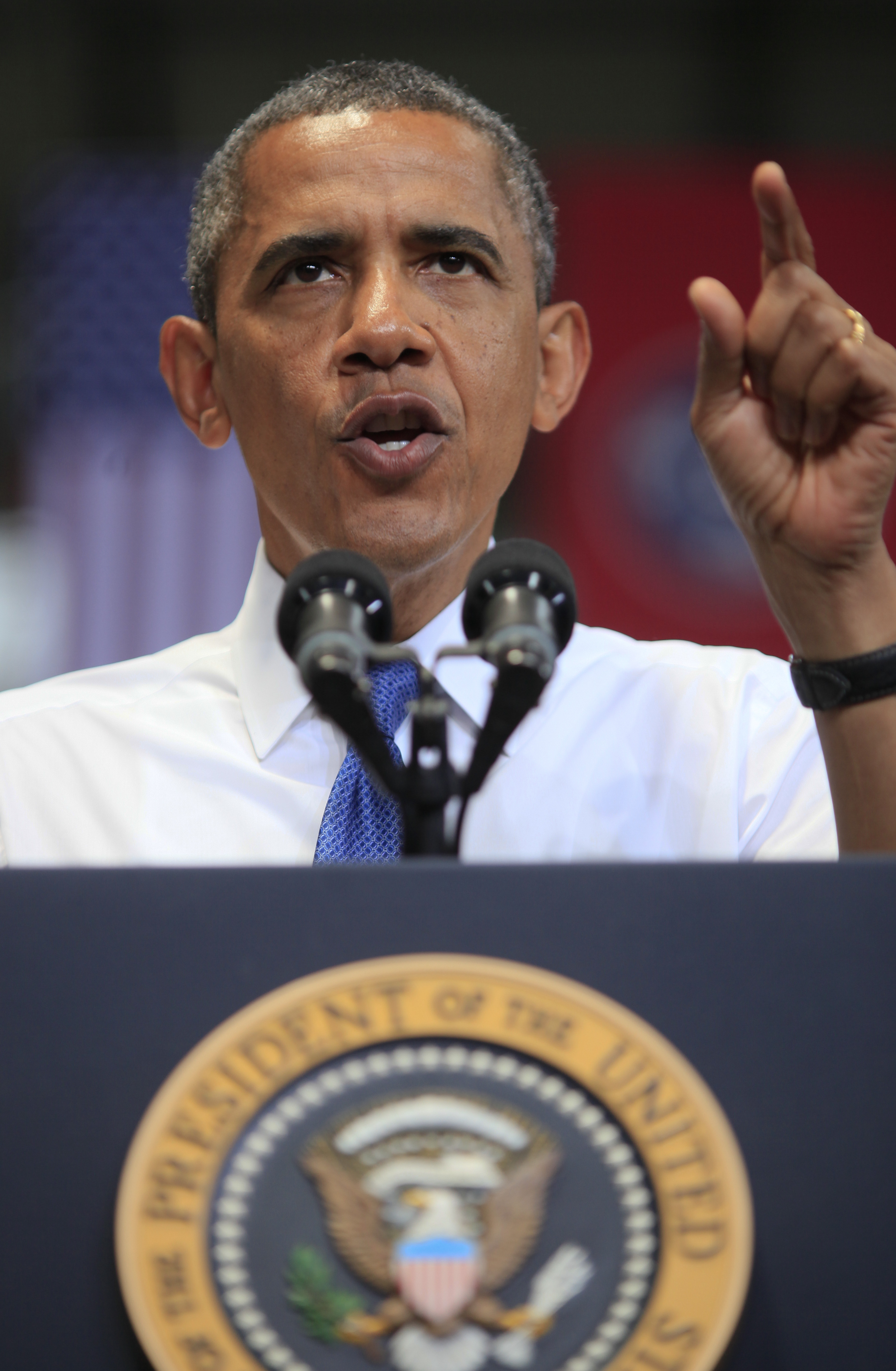When President Barack Obama spoke here Tuesday, one of the items he touted as an accomplishment and also as a job-creator from his "fix it" plan was energy.
The topic didn't get much attention in headlines or elsewhere because a proposed tax cut and the president himself and Air Force One were all far sexier.
But now that the jets have cooled, President Obama's energy points bear a bit more attention.
Some of the 7.2 million new jobs created in the country over the last 40 months were in energy, he said, though he didn't break down how many. He did say, "We produce more renewable energy than ever, and more natural gas than anyone."
Natural gas is a resource that is getting increasing attention in the Southeast and the Appalachians as a bridge fuel from dirty coal to cleaner and alternative energies. But it's also the fuel that we get with hydraulic fracturing, or fracking.
The trouble is that fracking - a method of mining natural gas by injecting chemicals, water and nitrous oxide into shale to cause it to fracture and release trapped gas - is not exactly clean. In fact, it can be anything but clean.
Nonetheless, the country - and the president - are clamoring for less dependence on foreign oil, and demand is up for natural gas because it's cheaper, at least temporarily.
That puts this region on the hot seat because the newest, brightest shale field sits just below our Appalachian Mountains and puts East Tennessee, North Georgia and Northeast Alabama front and center as a new Promised Land. Early this year, the University of Tennessee won a controversial nod from the Tennessee Building Commission to seek bids on drilling in UT's 8,636-acre Cumberland Forest, which is public property.
Later in his Tuesday speech here, the president talked again about energy, tagging it as No. 3 on his "fix it" list.
"We'll keep creating good jobs in wind, solar, and natural gas that are reducing energy costs, reducing dangerous carbon pollution, and reducing our dependence on foreign oil," he said.
"Now is not the time to gut the investments in American technology that have brought us to this point - now is the time to double down on renewables, and biofuels, and electric vehicles, and the research that will shift our cars and trucks off oil for good," he continued.
"And since the cheaper cost of natural gas is a huge boost to our businesses, we should develop even more, as long as we do it in a way that protects our air and water for our children and future generations," he said.
That last little phrase is the key: as long as we do it in a way that protects our air and water.
Obama did pointedly say the Keystone XL tar sands pipeline is not the answer, and he also said developing more natural gas must be done safely. And yes, we do have the technology.
The question is whether we have the will - the political will in the U.S. Congress and in the halls of environmental regulatory offices.
Certainly in Tennessee we don't have a particularly good track record of having the political will "to do it in a way" that is protective.
Nor do we seem to have that at EPA - at least not where fracking is concerned.
The Tennessee Joint Government Operations Committee several weeks ago approved new fracking rules that were drafted by the Tennessee Department of Environment and Conservation.
Those rules essentially offer no rules. They don't even require drillers to test wells or notify neighbors unless they pump in more than 200,000 gallons of water, and in East Tennessee the geology is so fragile that normally less than 200,000 gallons will be used per well. Nitrogen gas laced with chemicals will be used instead.
And just what are the chemicals in fracking water or fracking gas?
The drilling companies don't have to tell us, but water quality data from the test wells in other regions have confirmed high levels of carcinogenic chemicals, such as benzene (a constituent of diesel fuel, used in the fracking fluid, as well as a chemical called 2 Butoxyethanol, known to be used in fracking fluid).
Federal rules don't help either. In 2005, Congress approved legislation that exempts fracking from provisions of the Safe Water Drinking Act and the Clean Air Act. This exemption has been dubbed the "Halliburton Loophole."
On Tuesday, after the president's speech, the Sierra Club issued a statement from its Executive Director Michael Brune commending the president's focus on creating jobs with the development of clean energy innovation and manufacturing, where every dollar invested creates three times as many jobs as a dollar spent on oil or gas. But Brune added a caution about fracking.
"President Obama's comments over the last few days also make it clear that he knows Keystone XL is a bad deal for America," Brune said. "We urge him to recognize that a reliance on dirty natural gas poses many of the same threats."
Everyone wants clean, safe water and air, and almost everyone seems interested in America's energy independence.
So far, no one has found either the way or the will for ensuring both.
We cannot take our eyes off this mark. Our region, our mountains and our water are too important.
